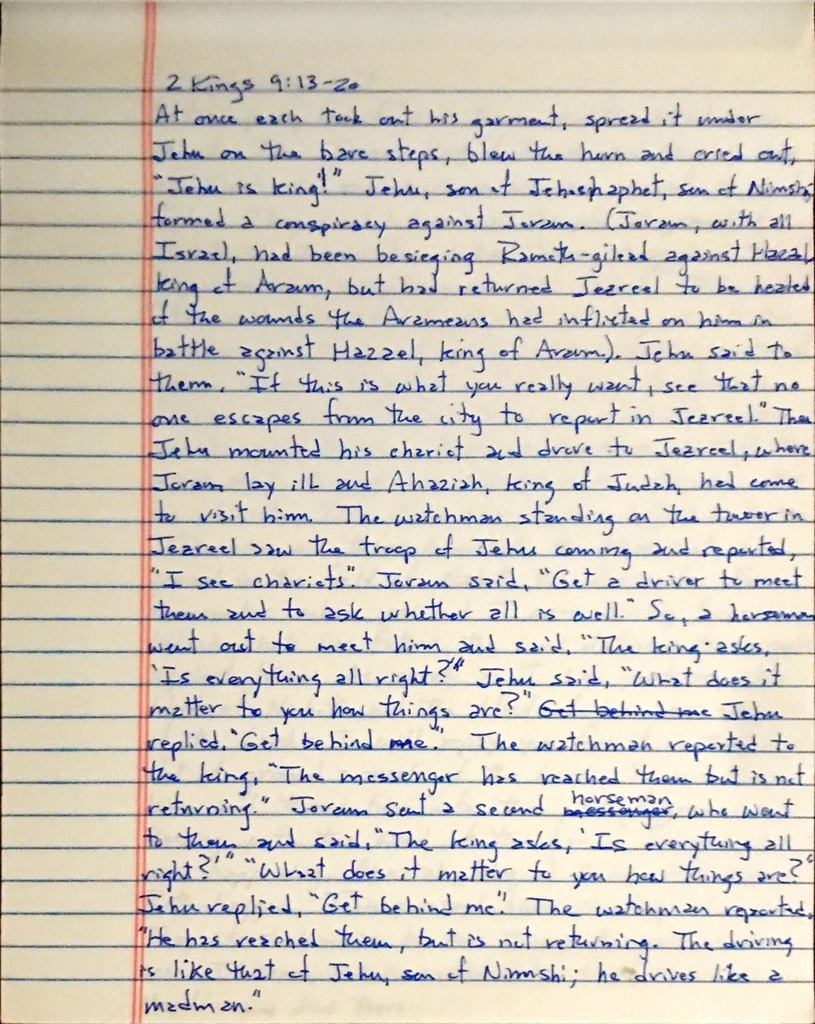- Home
- Daily Meditation
Jezebel’s Great Sin

Synopsis 2 Kings 9:28-10:1 9/29/2019
Jehu killed Joram, king of Israel. And he also killed King Ahaziah from the tribe of Judah. As a result, Ahaziah’s servants brought his body back to Jerusalem, where he was buried.
After he killed the two kings, Jehu returned to Jezreel. Here, he confronted Jezebel. And from outside her house, he ordered her servants to throw her from her balcony to the ground. The servants complied and Jezebel died on the road below her palace home.
In accordance with Elijah’s prophecy, Jezebel was never buried. Instead, dogs consumed her corpse before it could be buried.
Jezebel’s Great Sin
Jezebel’s great sin was that she normalized the worship of false gods.
Great Sin
God creates in each person a personal essence. And each human essence has the potential to contribute something entirely unique. So, creation is more than fiat. Creation is a cascade of creativity that emanates from the one, creative God, through each individual person He chose to create.
It follows that one person cannot replace another. And, a life lost means a contribution lost.
In the same way, a life poorly lived, means a contribution lost.
So, one of the most morally reprehensible things one human person can do is to deliberately block or limit the potential of another human person. This is the opposite of love. And this is a great sin.
In fact, this is the spirit of Jezebel.
“It would be better for him if a millstone were put around his neck and he be thrown into the sea than for him to cause one of these little ones to sin.” Luke 17:2
Jehu’s Desperate Act

Synopsis 2 Kings 9:21-27 8/27/2019
Jehu was racing toward Jezreel to confront King Joram. He had been anointed king by Elisha’s servant. And so, he was determined to get to King Joram before the king received word of what Elisha had done.
Because Jehu refused to stop for either of the messengers that Joram had sent, the king decided to take action of his own. He called for his chariot to be hooked up. And despite his battlefield injuries, he mounted up to meet Jehu outside the city.
Joram’s nephew was also with him. His name was Ahaziah and he was the king over Judah. So, together the two kings went out on their chariots to meet Jehu.
Upon meeting, Jehu proclaimed Elijah’s prophecy against the House of Ahab. And, Joram immediately recognized Jehu’s intent. Accordingly, he attempted to escape. But, Jehu killed him with a single arrow through the heart while he fled.
While there, he and his attendants also pursued and killed Ahaziah.
Jehu’s Desperate Act
Jehu killed both the king of Israel and the king of Judah in a single moment. He killed King Joram because of the king’s persistence in Baal worship.
But he also killed Ahaziah, who was both a descendent of King David and King Ahab. Clearly, he did this to prevent the house of David from reclaiming rule over the entire kingdom through intermarriage with Ahab’s daughter.
Maybe, on the face of it, Jehu seems a little bloodthirsty. And clearly, he wasn’t afraid to take decisive action. But it’s also important to remember that he was a reasonable man. He was a professional soldier who was esteemed by his peers. He wasn’t reckless.
So, for him, killing the two kings of Israel was an act of utter desperation. He didn’t have an alternative choice. He only did it because he believed the future of the nation was at stake.
Desperate Acts
We all want to be good. We all want to do well and be accepted. This is my hope for satisfaction and joy.
And, I think, this is how we are born. This is how we wake up each morning.
But try as I might, I never seem to fully succeed. I never actually do the good that I intend to do.
I can live with this persistent failure for a while. Sometimes, even a long while. But not forever. Eventually it will come to a head. And when that day comes, I’ll either act out in desperation or else I’ll capitulate entirely.
“Miserable one that I am! Who will deliver me from this mortal body?” Rom 7:24
Jehu Man of Action

Synopsis 2Kings 9:13-20 8/26/2019
Jehu was one of the generals leading King Joram’s army. But Elisha had sent a guild prophet to anoint Jehu the new king over Israel. So, after the prophet departed, Jehu informed the other generals of Elisha’s anointing. And they all acknowledged him as king.
Jehu immediately formed a plan and enlisted the help of the generals who had pledged their loyalty to him. Most of them remained at Ramoth-gilead to assure no news reached King Joram before Jehu could confront him.
Jehu took his attendants and raced for Jezreel, where the wounded king was recovering.
Jezreel was high above the valley and enjoyed an expansive view of the valley below. King Joram’s watchman saw Jehu as he approached from across the valley. So, Joram sent a messenger out to investigate who was approaching and why they were coming with such great speed.
However, when the charioteer met him, Jehu refused to stop. Instead, he ordered the messenger to fall in line with his attendants. Realizing that Jehu was not stopping to speak with the messenger, he sent another charioteer out as his messenger. And the same thing happened. Jehu refused to stop. Once again, he ordered the messenger to join his attendants. And then, he raced even faster to meet Joram in his palace.
Jehu Man of Action
Jehu was a man of action. With the clarity of purpose given to him by Elisha, he zealously forged ahead. He would not let anything deter him from achieving his purpose.
Person of Action
Acting with urgency is critical to success. But I’m only right to act with urgency when I’m pretty sure I know what I’m trying to accomplish. For Jehu, God gave clarity through the prophet. And in light of this truth, Jehu acted with determination.
But thanks be to God for His willingness to share His word with men on earth.
And so, we come to the scriptures in the way of Lectio Divina. We lectio (read). We meditatio (meditate). And we oratio (respond). Then, we contemplatio (contemplate). And finally, we actio (act).
Action is the fulfillment of knowing through prayer.
“Be doers of the word and not hearers only, deluding yourselves.” James 1:22
Jehu’s Unexpected Calling

Synopsis 2Kings 9:3-12 8/23/2019
Israel warred against Aram. They were fighting for control of a border community known as Ramoth-gilead. The Israelites had just lost a fight. But still, they remained on the battlefield.
King Joram, the son of Ahab, was injured in the battle. So, the Israelite generals managed the army while Joram recovered from his wounds.
At about this time, Elisha sent one of the guild prophets to Ramoth-gilead. Elisha gave the other prophet a horn of oil. And he instructed him to anoint a man named Jehu as the next king over Israel. Jehu was one of the commanding generals located at Ramoth-gilead.
Elisha gave the guild prophet very precise instructions. Specifically, Elisha directed the man to speak to Jehu alone. Additionally, he was to anoint Jehu’s head with oil. And he was told to prophecy the destruction of King Joram and all of the other of King Ahab’s descendants, including Ahab’s wife Jezebel.
The guild prophet did everything just as he was directed to do.
Jehu Unexpected Calling
As an important general in the army, Jehu was naturally a man of action. But even he could not have anticipated what God intended. So, he was not specifically prepared to become king by virtue of his training.
And yet, when the call came, he was ready. He had to be. The anointing was a sentence or either life of death. Once anointed he had to quickly assume the throne or he would be killed by King Joram or those loyal to the son of Ahab.
Your Call Could Come in a Moment
My tendency is to think that the scripture’s call to remain vigilant has to do with the second coming. But Jesus assured us that no one will be able to mistake His day of return. The greater danger is that I won’t be ready or available on the day when He calls me to do something unexpected.
So be ready. You never know when you’ll be called.
“So too, you also must be prepared, for at an hour you do not expect, the Son of Man will come.” Matt 24:44
Effort to Reunite the Kingdom

Synopsis 2Kings 8:23-9:2 8/22/2019
At this time, the king of Judah was Joram, the son of Jehoshaphat. Joram reigned as king for eight years. And then, he died. When he died, his son became king. This was king Ahaziah.
The two royal families from the two kingdoms of Israel had begun to intermarry. As a result, Ahaziah was not only the king of Judah, but he was also the nephew of the king of Israel.
Meanwhile, the king of Israel was fighting with the Arameans led by King Hazael. The Arameans were from further north. And their capital was Damascus. But they were fighting with Israel for control over Ramoth-gilead, a boundary region that had been won by the Arameans during the time of King Ahab.
So, Joram and Ahaziah agreed to join together in the fight against Hazael. The battle went badly for Israel. And King Joram, son of Ahab, was badly injured.
So, Joram departed the region and went to the safety of Jezreel to recover from his injuries.
After the defeat, King Ahaziah returned to Judah with his army. But after this, he went by himself to Jezreel to visit King Joram while he healed from his wounds.
Effort to Reunite the Kingdom
The two kingdoms of Israel had become increasingly close through intermarriage. So, King Joram of Israel was the uncle of King Ahaziah of Judah.
As the younger ruler, Ahaziah supported his uncle’s effort to fight against the King of Aram. And when the fight went badly and Joram was injured, Ahaziah came to him to help in his convalescence. It was an appropriate family thing to do.
But Ahab was a notoriously evil king. And Joram followed mostly in his father’s footsteps. So, for Ahaziah to support Joram wasn’t necessarily a good thing because it increasingly allowed the influence of foreign gods to sway the leadership of Judah.
Family First If It’s the First Family
I was born-again in Christ. As such, I have been adopted. I have a new family.
Now if my natural, biological family doesn’t share this rebirth, then it is very likely that my new family and my old family will eventually come into conflict.
This comes as no surprise.
However, if my natural family isn’t following Christ, the conflict must never allow me to return to these old ways. In this sense, my first family is the family of Christ. And my natural family on earth are a people whom I’m called upon to love and serve in a special way.
“See what love the Father has bestowed on us that we may be called the children of God. Yet so we are. The reason the world does not know us is that it did not know him.” 1John 3:1
Faithlessness and Loss
Synopsis 2 Kings 8:13-22 8/21/2019
Hazael became king of Aram. As Elisha had prophesied, he became king by killing his master, King Ben-hadad. Hazael was a treacherous man who killed the king while he was in his bed recovering from illness.
Back in Israel, Joram, son of Jehoshaphat, became the king of Judah after his father’s death. But at the same time, the king of Israel was also named Joram.
So, the king of the northern Israel was Joram and the king of Judah (the southern kingdom of Israel) was also named Joram. Although it’s not explicitly stated, this seems to have been an effort by their father’s to eventually consolidate the kingdom under a single ruler.
To make matters more confusing, King Joram of Judah married the sister of King Joram of Israel. And so, he began to adopt the idolatry of the northern kingdom.
Meanwhile, there was trouble in Edom. From the time that Israel was combined under just one king, Edom had been subject to Judah. But during the reign of King Joram, Edom rebelled against Judah. They wanted to rule themselves. And so, they crowned their own king. As a result, they no longer paid tribute to the king of Judah.
Faithlessness and Loss
By the end of King Solomon’s reign, Israel had become a great nation that had formed an empire of smaller nations that the kings of Israel controlled directly. However, as the nation split in two, it was harder for the smaller kingdoms to maintain control over the surrounding nations.
What made matters worse, both the northern kingdom and the kingdom of Judah began practicing idolatry. As they did, the two smaller Israelite kingdoms further decreased in power and influence. As a result, the nations that had been subject to the Israelite empire in the past began to rebel.
In the northern kingdom Israel, this resulted in a series of dynasties where one man would take power as king. But typically, after a generation or two, each of these dynasties became corrupt. After which, the dynasties were typically supplanted by yet another man who would be king.
However, things were different in southern kingdom. Judah continued to be governed by the house of David. In other words, a descendant of King David remained on the throne throughout the period of the kings.
Yet, even though David’s dynasty remained, Judah saw consistent reductions in it’s power and influence as the nation drifted away from worshipping the one true God. Finally, it lost control over Edom, a close neighbor whose people were descended from Israel’s brother Esau.
“But if someone’s work is burned up, that one will suffer loss; the person will be saved, but only as through fire.” 1 Cor 3:15
Elisha Honored

Synopsis 2Kings 8:5-12 8/20/2019
Elisha had predicted a famine that lasted seven years. After the famine was over, Elisha’s servant met with the king of Israel.
The servant’s name was Gehazi. And so, the king asked Gehazi to recite some of Elisha’s many accomplishments. Just as Gehazi was speaking with the king, the Shunamite woman came to request the return of her land. She had left Israel at Elisha’s direction to avoid the famine.
Meanwhile, Elisha was in Damascus. At that time, the king of Damascus was Ben-hadad. And Ben-hadad was sick.
So, when he heard that Elisha was in the city, he sent a messenger named Hazael to meet him. Hazael was tasked with giving Elisha a large gift. Also, the king directed Hazael to inquire if Elisha could prophecy concerning Ben-hadad’s recovery.
Accordingly, Hazael inquired. And Elisha responded by giving a prophecy for both the king and Hazael. Elisha prophesied: The king would live and should be told so. But in a separate word for Hazael he prophesied that the king would die and Hazael would become the new king.
Elisha Honored
By this time, Elisha had a long track record with the Arameans from Damascus. As a result, the Arameans had come to respect both Elisha and the God of Israel.
And so, before the king even considered asking for a prophetic word, he offered a sensational gift. The intent wasn’t to sway Elisha as much as it was an effort to communicate the respectful regard the Arameans had come to esteem him.
Life and Honor
There is a certain danger in seeking honors. Jesus once said, “How can you believe, when you accept praise from one another and do not seek the praise that comes from the only God?” (John 5:44)
Yet, very often God will magnify examples of extraordinary faithfulness and love. And He seems to do this in order to both encourage faithful believers and convict those he hopes to save.
But the honor isn’t for my benefit. It is reserved for the glory of God’s kingdom alone.
“Whoever pursues justice and kindness will find life and honor.” Prov 21:21
Faith In Elisha

Synopsis 2Kings 7:17-24 8/19/2019
Elisha had predicted that the siege of Samaria and the accompanying famine would be over in a day. But the king’s adjutant mocked Elisha and blasphemed God. Accordingly, it was further prophesied that he would see the phenomena of cheap grain but “not taste of it”.
When the people realized that the Arameans had fled without their possessions, they rushed the gate. They all went out to plunder the Aramean camp. As they did, they trampled the king’s adjutant who had blasphemed. He died in the gate having seen the reduced grain prices in the marketplace.
Later, Elisha met with the Shunamite woman. He warned her that a severe famine was coming to all the land of Israel. And he told her to flee to a land away from Israel for seven years until the famine ended.
Faith in Elisha
The woman from Shunam had faith in Elisha. Her confidence was in Elisha’s ability to know the words of God. So, if he said it was time to go, then she was going to go.
Her actions revealed her belief. And her belief was that Elisha had the ability to hear from God.
Faith and Relationship
Faith is about relationship. And more specifically, the way Christians understand it, faith is the belief that Jesus Christ is the Son of the one, true God. And further, it is the belief that through His intercession, we are saved and restored into a relationship with God.
What’s more, Christian faith is a belief that God is both personable and relatable. And it is the belief that God cares and even loves those whom He has created.
So, God is a person who knows and loves other persons.
That’s the claim.
Treating God like a person is faith. Accordingly, speaking to Him like a person is an act of faith.
And, meeting with Him as I would with any other earthly person is an evidence of my faith.
God has shepherded me into this particular moment of time for some greater purpose. Responding to the possibilities of my life from this vantage is living my life in faith.
“But without faith it is impossible to please him, for anyone who approaches God must believe that he exists and that he rewards those who seek him.” Heb 11:6
Elijah’s Prophecy

Synopsis 2 Kings 6:28-7:1 8/14/2019
Samaria was the capital city of Israel. The kingdom of Aram was north of Israel, centered around the city of Damascus. The king of Aram had invaded Israel and besieged Samaria. And, this created a great famine in the city.
The Israelites in Samaria were starving. Some had even succumbed to the temptation of cannibalism. And yet, the king of Israel was helpless. In his despondency, he gave up his trust in Elisha the prophet and also the God of Israel. And he went so far as to order Elisha to be put to death.
Instead of reaching out to Elisha and eliciting his prayers, he sent a young adjutant to capture Elisha. However, God forewarned Elisha. So, instead of capturing Elisha, the young adjutant blasphemed God. He questioned why anyone should follow God if God intended to treat them badly.
Elisha responded to the man by prophesying the end of the siege. But he did so in such a fantastic way that the man was incredulous. He retorted that Elisha’s prophecy was impossible and could not possibly come true.
Elijah’s Prophecy
Despite the siege and the severe famine, Elijah prophesied that grain prices would return to historical averages in the course of just twenty-four hours. The adjutant couldn’t imagine how this could happen. There was no sign of the siege ending. And, even if the siege were to end within a day, it would take years of harvests for grain prices to return to normal.
So, he ruled out the prophecy as impossible.
God and Faithlessness
It’s a strange reality of both prayer and life that human persons participate in the extraordinary reality of miracles.
“And he did not work many mighty deeds there because of their lack of faith.” Matt 13:58
Elisha’s Misdirection

Synthesis 2Kings 6:18-27 8/13/2019
The Arameans surrounded Elisha’s house in the night. Their plan was to capture the prophet in a surprise attack at sunrise. So, Elisha prayed to God that the Aramean soldiers would be struck blind and confused. And after this, he convinced them that they were in the wrong place and that they were trying to apprehend the wrong man.
As a result, he persuaded them to follow him. And then, he led the whole military formation on a march to the Israelite capital city of Samaria. And there, he delivered them to the King of Israel.
The king of Israel wondered if he should slaughter the Aramean force. But instead, Elisha directed him to feed them and send them back to their king. So, the king did as Elisha directed.
Afterward, the king of Aram invaded Israel with a full army. Consequentially, he besieged Samaria. And because of the siege, the people of Samaria experienced a great famine.
Elisha’s Misdirection
Through the power of God, Elisha created confusion. And he used this to redirect the Aramean army into the hands of the king of Israel.
And with this demonstration of power, he sent the military force back to Damascus. It was a message to the king of Aram that no king could actually outmaneuver the God of all Creation.
Elusive Wisdom of Love
It is written: If your enemies are hungry, give them food to eat, if thirsty, give something to drink; For live coals you will heap on their heads, and the LORD will vindicate you.” (Prov 25:22)
There is a wisdom here that beguiles the faithless.
But, love really is like this. It’s the last option I intuitively think to consider. And still, it consistently testifies to the transcendent wisdom of God.
A simple act of love has the power to both beguile and convert a soul.
“Rather, we speak God’s wisdom, mysterious, hidden, which God predetermined before the ages for our glory, and which none of the rulers of this age knew; for if they had known it, they would not have crucified the Lord of glory.” 1Cor 2:7-8










